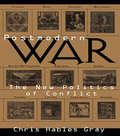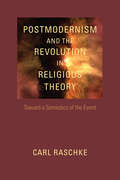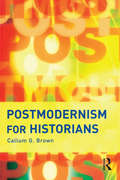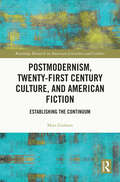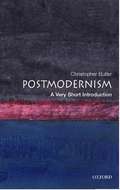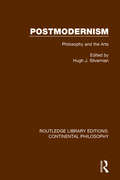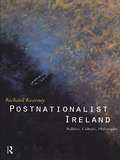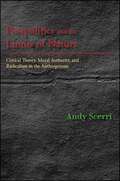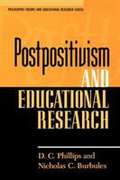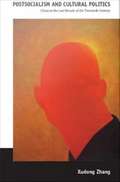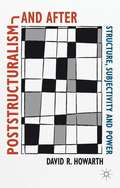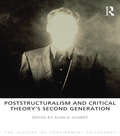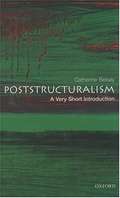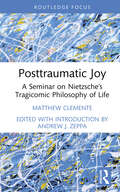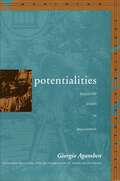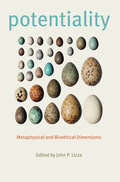- Table View
- List View
Postmodern War: The New Politics of Conflict (Critical Perspectives Ser.)
by Chris Hables GrayFirst published in 1997. Routledge is an imprint of Taylor & Francis, an informa company.
Postmodernism and China
by Arif Dirlik Xudong ZhangFew countries have been so transformed in recent decades as China. With a dynamically growing economy and a rapidly changing social structure, China challenges the West to understand the nature of its modernization. Using postmodernism as both a global frame of periodization and a way to break free from the rigid ideology of westernization as modernity, this volume's diverse group of contributors argues that the Chinese experience is crucial for understanding postmodernism. Collectively, these essays question the implications of specific phenomena, like literature, architecture, rock music, and film, in a postsocialist society. Some essays address China's complicity in--as well as its resistance to--the culture of global capitalism. Others evaluate the impact of efforts to redefine national culture in terms of enhanced freedoms and expressions of the imagination in everyday life. Still others discuss the general relaxation of political society in post-Mao China, the emergence of the market and its consumer mass culture, and the fashion and discourse of nostalgia. The contributors make a clear case for both the historical uniqueness of Chinese postmodernism and the need to understand its specificity in order to fully grasp the condition of postmodernity worldwide. Although the focus is on mainland China, the volume also includes important observations on social and cultural realities in Hong Kong and Taiwan, whose postmodernity has so far been confined--in both Chinese and English-speaking worlds--to their economic and consumer activities instead of their political and cultural dynamism. First published as a special issue of boundary 2, Postmodernism and China includes seven new essays. By juxtaposing postmodernism with postsocialism and by analyzing China as a producer and not merely a consumer of the culture of the postmodern, it will contribute to critical discourses on globalism, modernity, and political economics, as well as to cultural and Asian studies. Contributors. Evans Chan, Arif Dirlik, Dai Jinhua, Liu Kang, Anthony D. King, Jeroen de Kloet, Abidin Kusno, Wendy Larson, Chaoyang Liao, Ping-hui Liao, Sebastian Hsien-hao Liao, Sheldon Hsiao-peng Lu, Wang Ning, Xiaobing Tang, Xiaoying Wang, Chen Xiaoming, Xiaobin Yang, Zhang Yiwu, Xudong Zhang
Postmodernism and History
by Willie ThompsonIn this clear, jargon-free guide, Willie Thompson provides a concise introduction to postmodernist theory and its significant impact on the study of history. Although this is a hotly-debated topic, with much of the current literature being both polemical and inaccessible to the beginner, Thompson offers straightforward explanations of complex concepts and shows how the debates are relevant to students' own work. Postmodernism and History: - considers the origins of postmodernism in both the ideas of poststructuralist thinkers, particularly Michel Foucault, and the political and cultural developments of the late 20th century - explores themes such as the treatment of historical evidence, problems of historical representation, feminist history, ethical judgements on past events, and the validity of metanarrative or long-term historical explanation - discusses critically the work of a number of current and recent practicing historians - including Joan Scott, Roy Porter, Patrick Joyce and James Vernon - who have used postmodernist ideas in their writing - enquires how far postmodern thought has been absorbed into mainstream historiography
Postmodernism and the Environmental Crisis
by Arran GarePostmodernism and the Environmental Crisis is the only book to combine cultural theory and environmental philosophy. In it, Arran Gare analyses the conjunction between the environmental crisis, the globalisation of capitalism and the disintegration of the culture of modernity. It explains the paradox of growing concern for the environment and the paltry achievements of environmental movements. Through a critique of the philosophies underlying approaches to the environmental crisis, Arran Gare puts forward his own, controversial theory of a new postmodern world view. This would be the foundation for the environmental movement to succeed. Arran Gare's work will be a vital reading for advanced students of environmental studies, as well as for environmental philosophers and cultural theorists.
Postmodernism and the Postsocialist Condition: Politicized Art under Late Socialism
by Ales ErjavecThis book, with in-depth perspectives on art and artists in the former Soviet Union, captures a singular period in the history of world art, and a critical moment in the cultural and political transition from the last century to our own.
Postmodernism and the Revolution in Religious Theory: Toward a Semiotics of the Event (Studies in Religion and Culture)
by Carl RaschkeWhile the academic study of religion has increased almost exponentially in the past fifty years, general theories of religion have been in significant decline. In his new book, Carl Raschke offers the first systematic exploration of how the postmodern philosophical theories of Jacques Derrida, Gilles Deleuze, Alain Badiou, and Slavoj i ek have contributed significantly to the development of a theory of religion as a whole. The bold paradigm he uses to articulate the framework for a revolution in religious theory comes from semiotics—namely, the problem of the sign and the "singularity" or "event horizon" from which a sign is generated.
Postmodernism for Historians
by Callum G. BrownPostmodernism is an essential approach to History. This is the first dedicated primer on postmodernism for the historian. It offers a step-by-step guide to postmodern theory, includes a guide to how historians have applied the theory, and provides a review of why its critics are wrong. In simple and clear language, it takes the reader through the chain of theory that developed in the 20th century to become now, in the early 21st century, the leading stimulant of new forms of research in History.With separate chapters on The Sign, The Discourse, Post/Structuralism, The Text, The Self, and Morality, this book will encourage a new critical awareness of Theory when reading books of History, and when writing essays and dissertations. Armed with the principal ideas of Saussure, Barthes, Foucault, and Derrida, the historians can formulate how to combine empirical History with the excitement of fresh perspectives and new skills, merged in the new moral impetus of the postmodern condition. Designed for the beginner this is the essential postmodern starting point.
Postmodernism, Sociology and Health
by Nicholas J. FoxThe emergence of post-structuralism and postmodernism within social theory has challenged many of the fundamentals of modernist social science. The emphasis which these approaches place on language, firstly as the unavoidable mediator between an object of study and a description of that object, and secondly as something which is profoundly unstable, marks the broadest of these challenges -- to the possibility that sociology and the other human sciences might achieve rational knowledge of the world.
Postmodernism, Twenty-First Century Culture, and American Fiction: Establishing the Continuum (Routledge Research in American Literature and Culture)
by Matt GrahamPostmodernism’s ‘end’ is a complex and contentious topic. Yet, one overarching consensus emerges: the postmodern has been surpassed. This book poses a thought experiment challenging this position – what if postmodernism persists within the twenty-first century?Rather than designate a new epoch or coherent movement, this book interrogates the fragmented, contradictory, and counterintuitive endurance of postmodern aesthetics within post-Cold War America. An alternative use of postmodern aesthetics becomes possible when they are decoupled from their twentieth-century historical location. Collectively, these repetitions posit a postmodern continuum, contrasting the widely called-for succession of postmodernism via this decoupling. When postmodern aesthetics are no longer unconsciously repeated within their cultural moment, this emergent shift within a period ‘after’ postmodernism presents an alternative historical positioning and use. After their cultural vanguard, postmodern aesthetics become a confrontation of the chaotic realism of an inescapable post-Cold War capitalism, tapping into this cultural zeitgeist through literature.
Postmodernism: A Beginner's Guide (Beginner's Guides)
by Kevin HartKevin Hart introduces the reader to all of the major figures and issues in the field, including Derrida, Baudrillard and Foucault, as well as explaining what makes a thinker or writer postmodern.
Postmodernism: A Very Short Introduction
by Christopher ButlerPostmodernism has become the buzzword of contemporary society over the last decade. But how can it be defined? In this highly readable introduction the mysteries of this most elusive of concepts are unraveled, casting a critical light upon the way we live now, from the politicizing of museum culture to the cult of the politically correct. The key postmodernist ideas are explored and challenged, as they figure in the theory, philosophy, politics, ethics and artwork of the period, and it is shown how they have interacted within a postmodernist culture.
Postmodernism: Philosophy and the Arts (Routledge Library Editions: Continental Philosophy #8)
by Hugh J. SilvermanThis book, first published in 1990, addresses the broad cultural phenomenon that is postmodernism. The first part of the book raises some general theoretical questions about postmodernism – its language and its politics, for example. The second section attends to particular ‘sites’, namely the various arts themselves and the philosophical understanding of them. Here one finds specific readings of architecture, painting, literature, theatre, photography, film, television, dance and fashion.
Postnationalist Ireland: Politics, Culture, Philosophy
by Richard KearneyThe encroachment of globalization and demands for greater regional autonomy have had a profound effect on the way we picture Ireland. This challenging new look at the key of sovereignty asks us how we should think about the identity of a postnationalist' Ireland. Richard Kearney goes to the heart of the conflict over demand for communal identity - traditionally expressed by nationalism, and the demand for a universal model of citizenship - traditionally expressed by republicanism. In so doing, he asks us to question whether the sacrosanct concept of absolute national sovereignty is becoming a luxury ill afforded in the emerging new Europe. Kearney then takes us beyond the political with chapters on the influence of philosophers such as George Berkeley, John Toland and John Tyndall and looks at some of the myths in Irish poetry and nationhood. Postnationalist Ireland provides a recasting of contemporary Irish politics, culture, literature and philosophy and will appeal to students of these subjects and Irish studies in general.
Postpolitics and the Aesthetic Imagination
by Juan MenesesIgniting political power through the lens of art and the imaginationPostpolitics and the Aesthetic Imagination investigates the erosion of meaningful political action in today&’s world. Gathering writings from an array of scholars, editor Juan Meneses asks: can an aesthetic theory of postpolitics help us understand and counteract the most insidious processes of depoliticization? The contributors to this volume explore how the aesthetic imagination can play a crucial role in reenvisioning key political elements, including governance, agency, rights, and responsibility. With a survey of various artistic mediums—film, dance, music, literature, and digital media—the essays illustrate how the aesthetic can reveal ways to breathe new life into the work of emancipatory politics. Reclaiming the arts and humanities as vital to political life, the contributors revisit but also move beyond the social sciences&’ central focus on neoliberalism and public administration to address other topics such as tech-capitalism, race, environmental violence, and patriarchy. Postpolitics and the Aesthetic Imagination argues for a conscious deployment of aesthetics to resist political anesthesia and promote a more just society, underscoring the role of the imagination in political engagement and change. Contributors: Jacquelyn Arcy, U of Wisconsin–Parkside; Christopher Breu, Illinois State U; Stephen Charbonneau, Florida Atlantic U; Eric Lemmon, Webster U; Robert P. Marzec, Purdue U; Allison Page, Rutgers U–Camden; Matthew Scully, U of Lausanne; Erik Swyngedouw, U of Manchester; Sherryl Vint, U of California, Riverside.
Postpolitics and the Limits of Nature: Critical Theory, Moral Authority, and Radicalism in the Anthropocene (SUNY series in New Political Science)
by Andy ScerriIn Postpolitics and the Limits of Nature, Andy Scerri offers a comprehensive overview of the critical theory project from the 1960s to the present, refracted through the lens of US politics and the American Left. He examines why past generations of radical ecological and social justice scholarship have been ineffective in the fight against injustice and rampant environmental exploitation. Scerri then engages a new wave of radicals and reformists who, in the wake of the Occupy movement and the 2016 presidential election, are reinventing the radical project as a challenge to injustice in the Anthropocene era. Along the way, he provides a fresh account of the thought of one of the major contributors to critical theory, Theodor Adorno, and of recent work that seeks to link Adorno's ideas to the so-called new realism in political philosophy and political theory.
Postpositivism and Educational Research
by D. C. Phillips Nicholas BurbulesThis volume presents in a forthright and lively way, an account of the philosophical position generally identified as 'Postpositivistic' that undergirds much of mainstream research in education and the related social sciences. The discussion throughout is informed by recent developments in philosophy of science. Authors D. C. Phillips and Nicholas C. Burbules cite a number of interesting examples from the educational research and evaluation literature to illustrate the value of a scientific approach. Many educational researchers aspire to carry out rigorous or disciplined inquiry aimed at producing accurate (and generally 'truthful') accounts of educational phenomena and the causal psychological or social processes that lay behind them. However, many recent critics have argued that it is a mistake to believe that research can yield theories, or advance claims that are true, objective, and value-neutral. In other words, that researchers always work within frameworks that embody important (and often questionable) assumptions about values and the nature of human knowledge. This book argues that , while there is much to be learned from recent critiques, traditional scientific values and assumptions are not outmoded. The authors show students how to implement and benefit from the scientific method in ways that take into account recent critiques.
Postsocialism and Cultural Politics: China in the Last Decade of the Twentieth Century
by Xudong ZhangIn Postsocialism and Cultural Politics, Xudong Zhang offers a critical analysis of China's "long 1990s," the tumultuous years between the 1989 Tiananmen Square crackdown and China's entry into the World Trade Organization in 2001. The 1990s were marked by Deng Xiaoping's market-oriented reforms, the Taiwan missile crisis, the Asian financial crisis, and the end of British colonial rule of Hong Kong. Considering developments including the state's cultivation of a market economy, the aggressive neoliberalism that accompanied that effort, the rise of a middle class and a consumer culture, and China's entry into the world economy, Zhang argues that Chinese socialism is not over. Rather it survives as postsocialism, which is articulated through the discourses of postmodernism and nationalism and through the co-existence of multiple modes of production and socio-cultural norms. Highlighting China's uniqueness, as well as the implications of its recent experiences for the wider world, Zhang suggests that Chinese postsocialism illuminates previously obscure aspects of the global shift from modernity to postmodernity. Zhang examines the reactions of intellectuals, authors, and filmmakers to the cultural and political conflicts in China during the 1990s. He offers a nuanced assessment of the changing divisions and allegiances within the intellectual landscape, and he analyzes the postsocialist realism of the era through readings of Mo Yan's fiction and the films of Zhang Yimou. With Postsocialism and Cultural Politics, Zhang applies the same keen insight to China's long 1990s that he brought to bear on the 1980s in Chinese Modernism in the Era of Reforms.
Poststructuralism and After
by David R. HowarthThis book articulates the key theoretical assumptions of poststructuralism, but also probes its limits, evaluates rival approaches and elaborates new concepts. Building on the work of Derrida, Foucault, Heidegger, Lacan, Laclau, L#65533;vi-Strauss, Marx, Saussure and Žižek, the book also provides a distinctive version of the poststructuralist project.
Poststructuralism and Critical Theory's Second Generation (The History of Continental Philosophy #6)
by Alan D. Schrift"Poststructuralism and Critical Theory's Second Generation" analyses the major themes and developments in a period that brought continental philosophy to the forefront of scholarship in a variety of humanities and social science disciplines and that set the agenda for philosophical thought on the continent and elsewhere from the 1960s to the present. Focusing on the years 1960-1984, the volume examines the major figures associated with poststructuralism and the second generation of critical theory, the two dominant movements that emerged in the 1960s: Althusser, Foucault, Deleuze, Derrida, Lyotard, Irigaray, and Habermas. Influential thinkers such as Serres, Bourdieu, and Rorty, who are not easily placed in "standard" histories of the period, are also covered. Beyond this, thematic essays engage with issues as diverse as the Nietzschean legacy, the linguistic turn in continental thinking, the phenomenological inheritance of Gadamer and Ricoeur, the influence of psychoanalysis, the emergence of feminist thought and a philosophy of sexual difference, the renewal of the critical theory tradition, and the importation of continental philosophy into literary theory.
Poststructuralism: A Very Short Introduction
by Catherine BelseyPoststructuralism changes the way we understand the relations between human beings, their culture, and the world. Following a brief account of the historical relationship between structuralism and poststructuralism, this Very Short Introduction traces the key arguments that have led poststructuralists to challenge traditional theories of language and culture. Whilst the author discusses such well-known figures as Barthes, Foucault, Derrida, and Lacan, she also draws pertinent examples from literature, art, film, and popular culture, unfolding the poststructuralist account of what it means to be a human being.
Poststructuralist Discourse Analysis
by Johannes AngermullerThis book presents developments of discourse analysis in France and applies its tools to key texts from five theorists of structuralism: Lacan, Althusser, Foucault, Derrida and Sollers. It pays special attention to enunciative pragmatics as a poststructuralist approach which analyzes the discursive construction of subjectivity.
Posttraumatic Joy: A Seminar on Nietzsche’s Tragicomic Philosophy of Life
by Matthew ClementePosttraumatic Joy presents the major themes and ideas of Nietzsche’s corpus from a continental and psychoanalytic perspective with a particular bent toward how they might illuminate ways of coping with and living beyond trauma and suffering. Through a series of transcribed and edited lectures—originally delivered as a part of the "Nietzsche for Clinicians" workshop run through the Center for Psychological Humanities and Ethics at Boston College—this work traces the genesis of such fundamental psychoanalytic concepts as repression, the death drive, and the Oedipus complex to the works of one of philosophy’s most audacious and original thinkers. Reading Nietzsche not as a philosopher in the traditional sense, but as a proto-psychoanalyst, a precursor to Freud and Lacan, this work explores his understanding of the origins of morality, the value of sublimation, the movement from mourning to melancholia—or, in Nietzsche’s terms, from trauma to tragedy—and the possibility of a life lived in affirmation and self-overcoming. This interdisciplinary book will be of interest to scholars and practitioners whose work intersects with continental philosophy and theoretical and philosophical psychology. This includes any psychotherapist, social worker, psychoanalyst, or pastoral counselor with an interest in understanding the deeply psychological philosophy of one of history’s greatest thinkers.
Potamo of Alexandria and the Emergence of Eclecticism in Late Hellenistic Philosophy
by Myrto HatzimichaliEclecticism is a concept widely used in the history of ancient philosophy to describe the intellectual stance of diverse thinkers such as Plutarch, Cicero and Seneca. In this book the historical and interpretative problems associated with eclecticism are for the first time approached from the point of view of the only self-described eclectic philosopher from antiquity, Potamo of Alexandria. The evidence is examined in detail with reference to the philosophical and wider intellectual background of the period. Potamo's views are placed in the context of key debates at the forefront of late Hellenistic philosophical activity to which he contributed, such as the criterion of truth, the first principles in physics, the moral end and the interpretation of Aristotle's esoteric works. The emergence of eclecticism is thus treated in connection with the major shift in philosophical interests and methods that marked the passage from Hellenistic to Imperial philosophy.
Potentialities: Collected Essays in Philosophy (Meridian: Crossing Aesthetics)
by Giorgio AgambenThis book collects fifteen major philosophical essays spanning more than twenty years by acclaimed Italian philosopher and author of State of Exception.Giorgio Agamben is one of contemporary philosophy’s most influential thinkers on the subjects of language, power, society. This collection of essays opens with an enlightening introduction by the translator Daniel Heller-Roazen, who situates Agamben’s work with respect to both the history of philosophy and contemporary European thought. The essays that follow articulate a series of theoretical confrontations with privileged figures in the history of philosophy, politics, and criticism, from Plato to Spinoza, Aristotle to Deleuze, Carl Schmitt to Benjamin, Hegel to Aby Warburg, and Heidegger to Derrida. Three fundamental concepts organize the collection as a whole: the existence of language; the nature of history; and the problem of potentiality in metaphysics, ethics, and the philosophy of language. All these topics converge in the final part of the book, in which Agamben offers an extensive reading of Melville’s short story “Bartleby the Scrivener” as a work that puts potentiality and actuality, possibility and reality, in a new light.
Potentiality: Metaphysical and Bioethical Dimensions
by John P. LizzaClassic articles and newly commissioned chapters analyze the nature of potentiality in bioethics.What is the moral status of humans lacking the potential for consciousness? The concept of potentiality often tips the scales in life-and-death medical decisions. Some argue that all human embryos have the potential to develop characteristics—such as consciousness, intellect, and will—that we normally associate with personhood. Individuals with total brain failure or in a persistent vegetative state are thought to lack the potential for consciousness or any other mental function. Or do they?In Potentiality John Lizza gathers classic articles alongside newly commissioned chapters from leading thinkers who analyze the nature of potentiality in bioethics, a concept central to a number of important debates. The contributors illustrate how considerations of potentiality and potential persons complicate the analysis of the moral consideration of persons at the beginning and end of life. A number of works explicitly uncover the Aristotelian background of the concept, while others explore philosophical issues about persons, dispositions, and possibility. The common assumption that potentiality is intrinsic to whatever has the potentiality is challenged by a relational view of persons, an extrinsic account of dispositions, and attention to how extrinsic factors affect realistic possibilities. Although potentiality has figured prominently in bioethical literature, it has not received a great deal of logical, semantic, and metaphysical analysis in contemporary philosophical literature. This collection will bring these thorny philosophical issues to the fore. Incorporating cutting-edge research on the topic of potentiality, this thought-provoking collection will interest bioethicists, philosophers, health care professionals, attorneys engaged in medical and health issues, and hospital and governmental committees who advise on policy and law concerning issues at the beginning and end of life.
